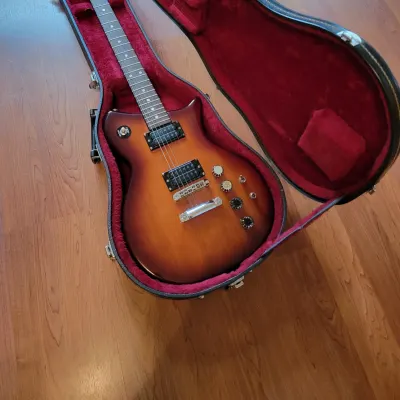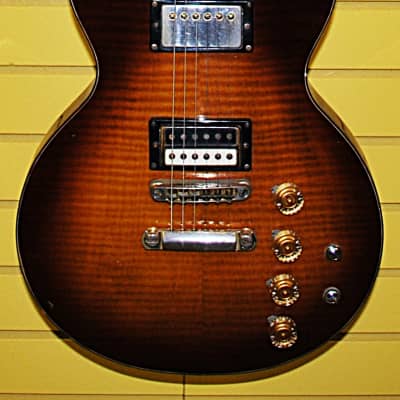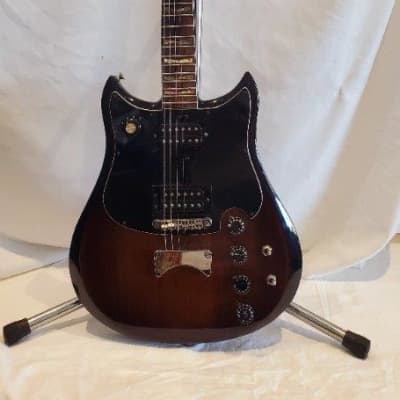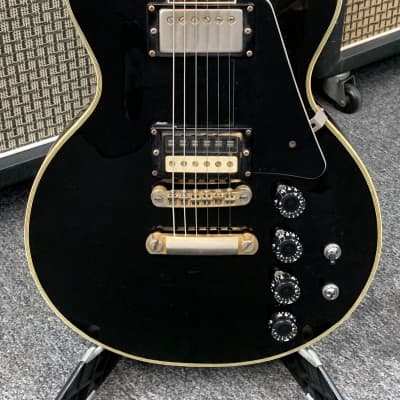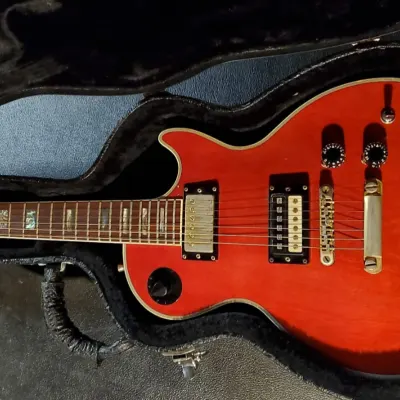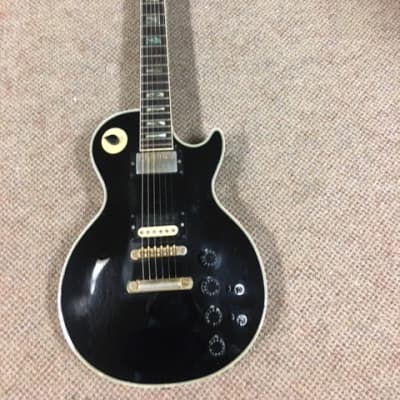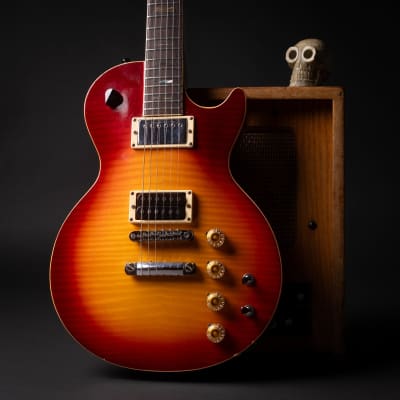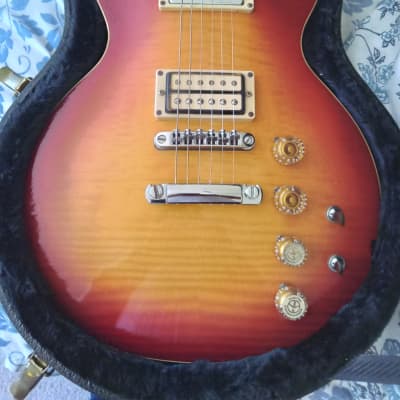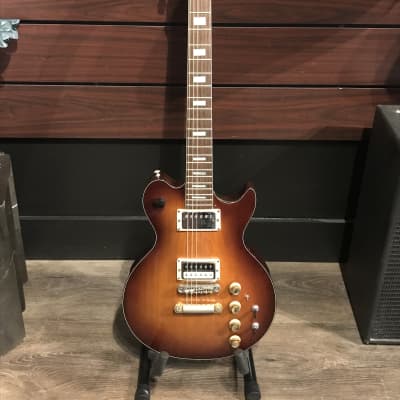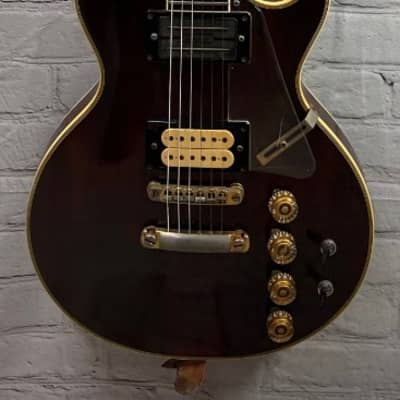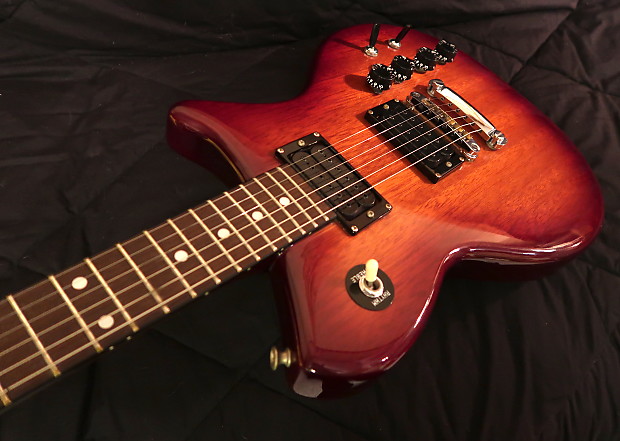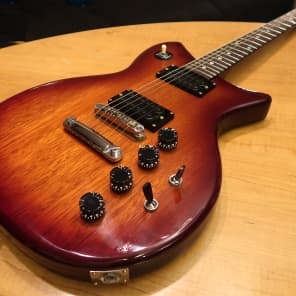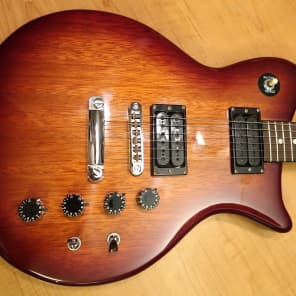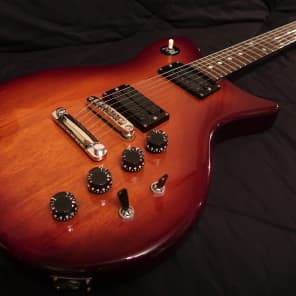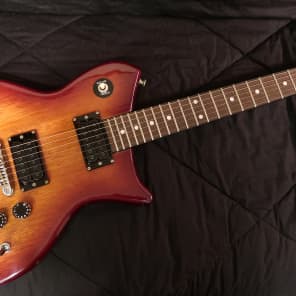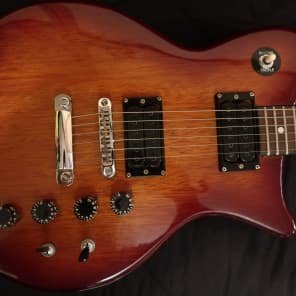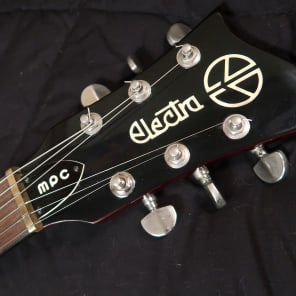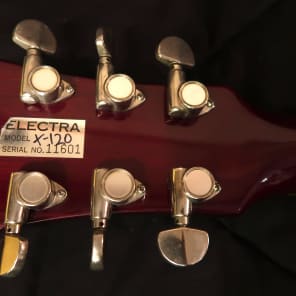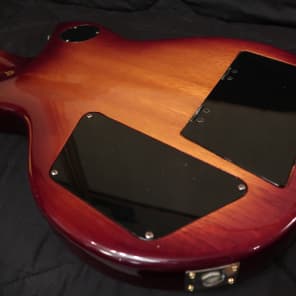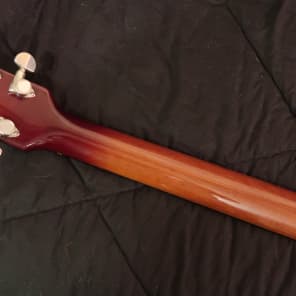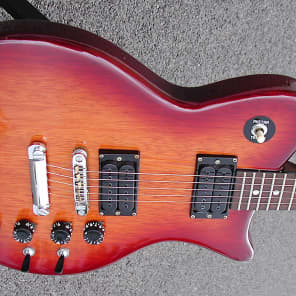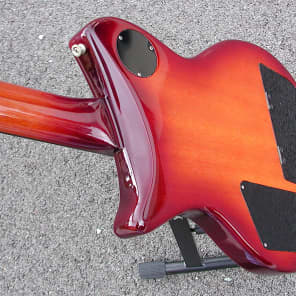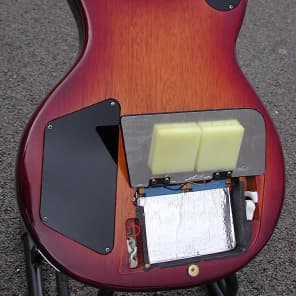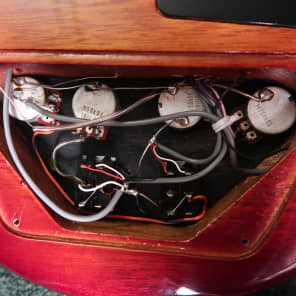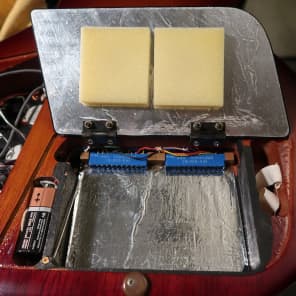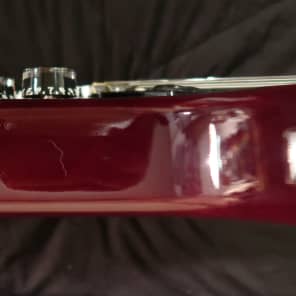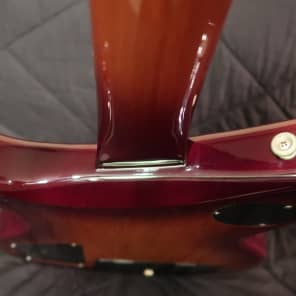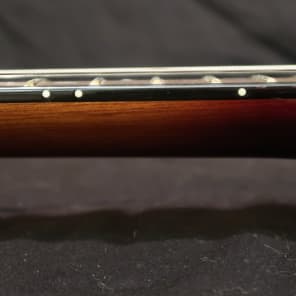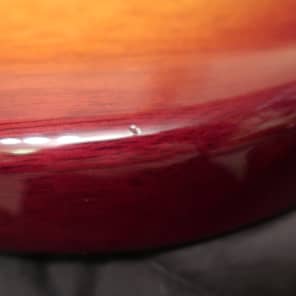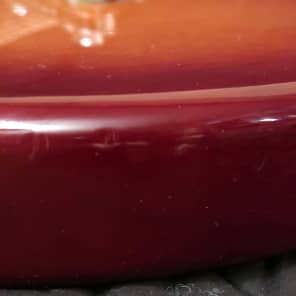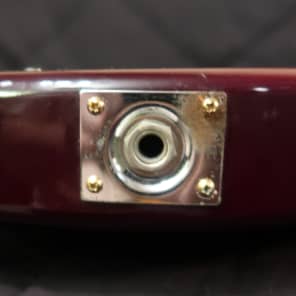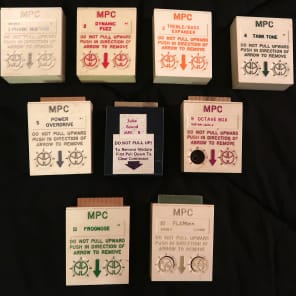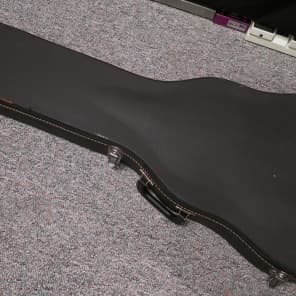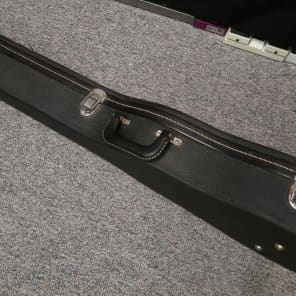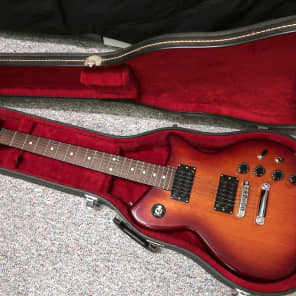This should be the Electra sale of the year. You'll never find another West model of this quality, with this provenance.
Several slightly different production prototypes were sent to Leslie West for his approval prior to the official introduction of the X-120; to the best of product manager Tom Presley's recollection, this guitar is
the one West officially approved as the production version. (The choices differed mostly in details of neck profile.)
Production was authorized from this prototype. It was then used at St Louis Music's pre-NAMM national sales meeting when West helped introduce the model to the company's salespeople, after which it lived at the offices of St Louis Music until Presley left the company. It's been in Tom's personal collection since then, unplayed in all that time – and I'm acting as his agent in this sale.
Guitar comes with two MPC modules of your choice (from a shrinking selection). You will also get a letter of provenance over Tom's signature, attesting to the guitar's history.
First, the guitar. As I hope the pictures show, it's in breathtaking condition. There are two small dents and one ding, all on the upper edge of the guitar. Other than that, it's cosmetically as new. Action is great and it plays beautifully. (It was last set up in SLM's guitar shop before it was shipped to West - but I put new strings on it several years ago.) It sounds fabulous - fat, rich, textured, with the sting you'd expect. The MPC modules work. The case is in similar condition to the guitar.
What's wrong: at least two of the pots are scratchy, and one has a dead spot in its rotation. If I was going to keep the guitar (and I wish I could), I'd just replace the pots. And there's a bit of rust on the jack plate (shown in picture).
Otherwise, it's a new prototype guitar - 40 years old.
Some background. St Louis Music's Electra brand began to break away from the mid-70s Japanese copy-guitar herd shortly after Tom Presley was hired as product manager in 1975. An experienced guitar tech and inveterate tinkerer, he started by having new pickups made to his spec, which were well accepted by players who discovered them. He also upgraded the tone circuits in Electra guitars, bringing to the middle of the market custom switching previously available only on high-end boutique instruments.
But Electra really got the industry's attention with the 1976 introduction of the
Modular
Powered
Circuit - MPC - modules. These effect modules, which plugged into sockets in a cavity in the guitar's body, were originally the brainchildren of SLM salesman Curt Trainer; Presley and John Karpowicz (soon to become the godfather of all things Crate) developed the idea into a workable system, and many of the early units were soldered and assembled at Presley's kitchen table.
In an era when floor effects were often noisy and unreliable, onboard effects imade a lot of sense. Shielded cavities and radically shortened cable runs kept noise down, while controls on the guitar were easier for guitarists to manage. Electra wasn't the first guitar with internal effects - but the MPC was the first modular system which permitted a player to swap in his choice of any two effects as he desired.
Twelve effects were available: 1-Phase Shifter; 2-Dynamic Fuzz; 3-Treble/Bass Exander; 4-Tank Tone; 5-Power Overdrive; 6-Filter Follower; 7-Auto Wah; 8-Tube Sound; 9-Octave Box; 10-Flanger; 11-Frog Nose; 12-Compressor.
(NOTE: when the listing started, all in the picture were available. As of May 1, you'll be able to choose from Phaser, Tube Sound, and Power Overdrive.)
Players were interested, and the MPC modules drew attention to the inherent quality of Electra instruments. They first went into generally Les Paul-inspired instruments. In 1977, they were part of the spec of the new Outlaw series, with an all-new body design unique in the industry - which also introduced Presley's heelless cutaway and neck joint.
And in 1978 came the Leslie West model. The company's relationship with West was forged through SLM employee John Mayer, who found West receptive to new guitar concepts and open to an endorsement deal.
Presley gave some thought to the iconic Gibson Les Paul Juniors on which West had forged his landmark signature tone, and came up with a mahogany slab with a mahogany neck. This combination gave the West model a unique tonal signature in an Electra range otherwise dominated by all-maple or maple-over-mahogany configurations. The body design was Presley's.
Again to create something in keeping with West's tonal vocabulary, Presley chose humbuckers of relatively modest output, and with broad full-range reproduction. The era was dominated by ever-higher-output pickups, but Presley felt West didn't need - and shouldn't be saddled with - shredder pickups. Instead, he went for something more toneful.
The guitar in this listing is "probably" equipped with early MagnaFlux pickups, says Presley. At the time, SLM ordered pickups from several Japanese manufacturers - and it didn't matter so much
who made a pickup, as long as it adhered to the spec (which Presley developed). In any case, Tom had his choice from a range of many pickup designs in the SLM guitar shop.
The combination of pickups, wood choice, and design - the thin slab is perfectly balanced, and comfortable to anyone who's played a Les Paul Junior or Melody Maker - was right on the money, and West loved the guitar right out of the case. West himself got two or three of the guitars; another couple went to SLM personnel, and this one went into Presley's stash.
The eventual production run of the Leslie West model over three years was, according to Presley, fewer than 500 guitars. At 799.00 retail, it was also one of the most expensive in the MPC range.
Who built this guitar? During the late 70s and early 80s, SLM worked with a variety of Japanese builders, chiefly Kasuga early in that period, transitioning toward Matsumoku later. Thus, over time some models were built at both plants (though usually not concurrently). Matsumoku made later X-120s - but this production prototype is a Kasuga product. Whoever made it was at the top of their game: it's just flawlessly put together.
(This example doesn't have a light to indicate the MPC modules are on, something I see mentioned in various online sources. If indeed the X-120
ever got such a feature, it must have come later.)
Leslie West himself had many nice things to say about his MPC model. (I quote here from "Leslie West: The Complete 1979 Interviews" which I find at the Jas Obrecht Music Archive at www-dot-jasobrecht-dotcom.)
Obrecht describes his first meeting with West in July 1979.
As I walked into his house that first day, Leslie was tuning up an unplugged double-cutaway electric guitar.
JO: Hi, Leslie. What kind of guitar is that?
LW: This is an MPC Electra. [Switches on his amp, creating a large, distorted tone.] Loud little sucker. This guitar has modules you can plug into it. [Plays a few fuzzed-out measures of “Hall of the Mountain King.”] Now, you can clean it up. [Pushes another switch and creates a strange octave effect.] I’ve got two octave dividers there. [Plays another riff.] Ain’t that something? Sounds like a harmony in there. You play guitar?
JO: Yes.
LW: You’ve got to feel what it feels like to play. Now, you’ve got to play very staccato. [Takes off his guitar and hands it to me.] Sit down and play. You’ll be more comfortable with it. [I begin playing a blues progression.] Now, you can’t play chords. You gotta attack the strings one by one and plunk it. Don’t let anything else ring except the note you’re hitting. With the chords, it takes a long time to practice to try to get the notes to ring clear. I’ll tell ya man, it was very hard at first. [As I play a few more riffs, Leslie activates switches on the guitar.]
JO: Unique type of sound.
LW: Isn’t it? I don’t think anybody’s got it. That’s why I’m so intrigued with this guitar. [Takes it back and solos at a very high volume.] Pretty good, huh? I got so sick of all these guitars with DiMarzios, DiFarzios – everything’s the same! And that guitar is just something new. It turns me on. [Leslie sets it down.] That’s an interesting sounding guitar, huh?
JO: Do you still keep a Les Paul around?
LW: Not here. I have them in New York. The Juniors are in two pieces, most of them. You know what happened? When I got tired of playing – really tired of playing – I was tired of Les Pauls, Strats, the whole business. And this Electra was laid on me and made me want to play again. There are 12 different modules you can put in there – there’s phasing, flanging, overdrive, octave divide, compressors.
JO: Looks like you can fit two in there at once. Can they hook up something to run more modules at once?
LW: Yeah, the guy at the company’s got a whole bank in the workshop. It holds fifty. Can you imagine that? It’s not a synthesizer, now. It’s just like all the pedals Hendrix had but without having to trip over all the wires.
Later in the article:
LW: I used to think for a while that Guitar Player was really getting ridiculous – every page is an ad. But you know what I like? It’s in a way good. See, you can always see what’s happening. Some of the ads are ridiculous, but I’ve seen a lot things. For instance, now I am sponsoring that guitar, the MPC guitar. I’m looking in your magazine, and I see an ad for Crate amp. I said, “Wow. What a nice-looking small amp.” I went to the factory one day, and I saw it. I didn’t know it was theirs. But I saw the ad in your magazine, and I’m working with the company. I sponsor the Crates now.
JO: It’s nice to get with a company like that.
LW: Especially if they’re behind you. This guitar [points to his MPC] is good. I’ve gotten a lot of free stuff in my life that sucks, but it is a good guitar.
Later in the interview, West gives the MPC credit for more than just being a nice guitar:
JO: What eventually happened with the drugs?
LW: It was too much of a hassle. I was spending more time worrying about getting them than what I could have been doing. I had to ask myself what was more important. Like I said, that guitar – the MPC guitar – had a lot to do with straightening me out, funny as it may seem. Something is a catalyst. You need something. When I saw it, I said, “Hey, it’s different.” A regular guitar wouldn’t have done me no good. I was sick of it. This had a little something to play with, just something to cut your head off. And that’s what did it.
_____
So that's it. Every guitar has a story. I don't claim this Leslie West model will change your life - but if you're an Electra enthusiast and collector, here's one unlike any other you'll come across.
And who knows what the market value is on a guitar like this? Leslie West models have sold for up to 1,300.00, in less pristine condition than this one - and certainly without documented and attested provenance from the guitar's designer.

